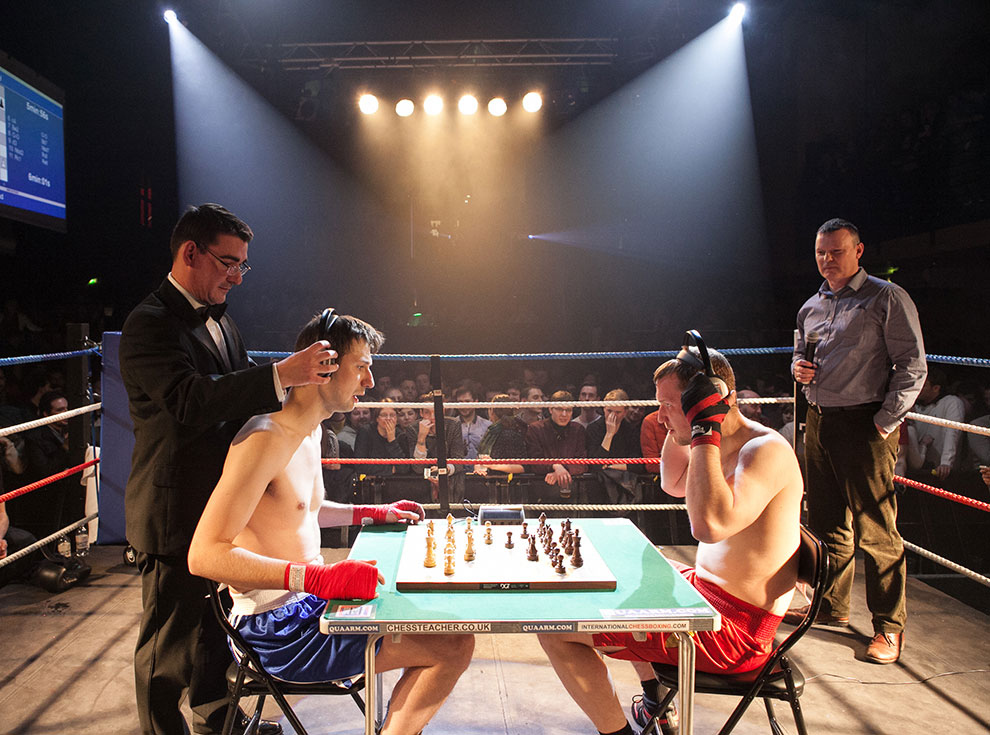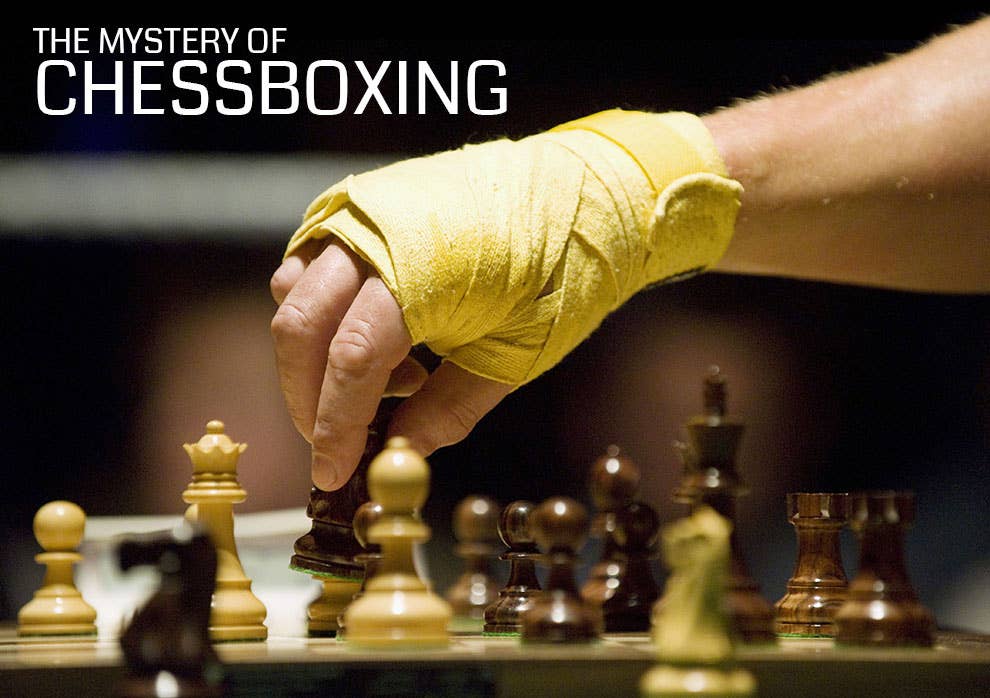
Round 6: The shorter fighter backs his 6-foot-2-inch opponent into the corner and pummels him with right and left hooks straight into the rib cage. The beanpole boxer has his hands up around his head, protecting the most vital body part used in this sport: the brain. He was afraid this would happen. His opponent has a mean left hook, and as he had said before the fight, because of his height, when he protects his head, the rest of his body is left open, lit white by the spotlight overhead.
In front of a crowd of 720 baying fans at The Scala nightclub in central London (which as you read this, hosts the U.K. Twerking Championships), Matt Read has already shaken off a big left jab two rounds ago that rocked him back and involuntarily forced his hands up to his temples in an attempt to turn his spinning mind back on an even keel. And now the blows are raining down on his pale rib cage and his kidneys, and large red welts are visible from the VIP bar on the third-floor balcony above the ring. Someone in the crowd shouts, "It's not worth it!"
One punch does it, and Read goes down. The referee counts, and Read looks up at him, half-dazed, but imploring him that he's OK. He is, and comes back fighting, realizing that if he doesn't go on the offensive he could be knocked on his ass again. The end of the round comes with a Klaxon and a roar from the crowd, and both men retreat to their corners, where their seconds towel them down, feed them water, and bait them with tactical advice and shouts of encouragement.
The referee beckons them back into the middle of the ring and, breathing heavily, sweat dripping off their bodies, they take their seats. Read moves his pawn a step forward, matched by his opponent, and shortly there's a flurry of piece exchanges that leaves both men severely diminished and exhausted.
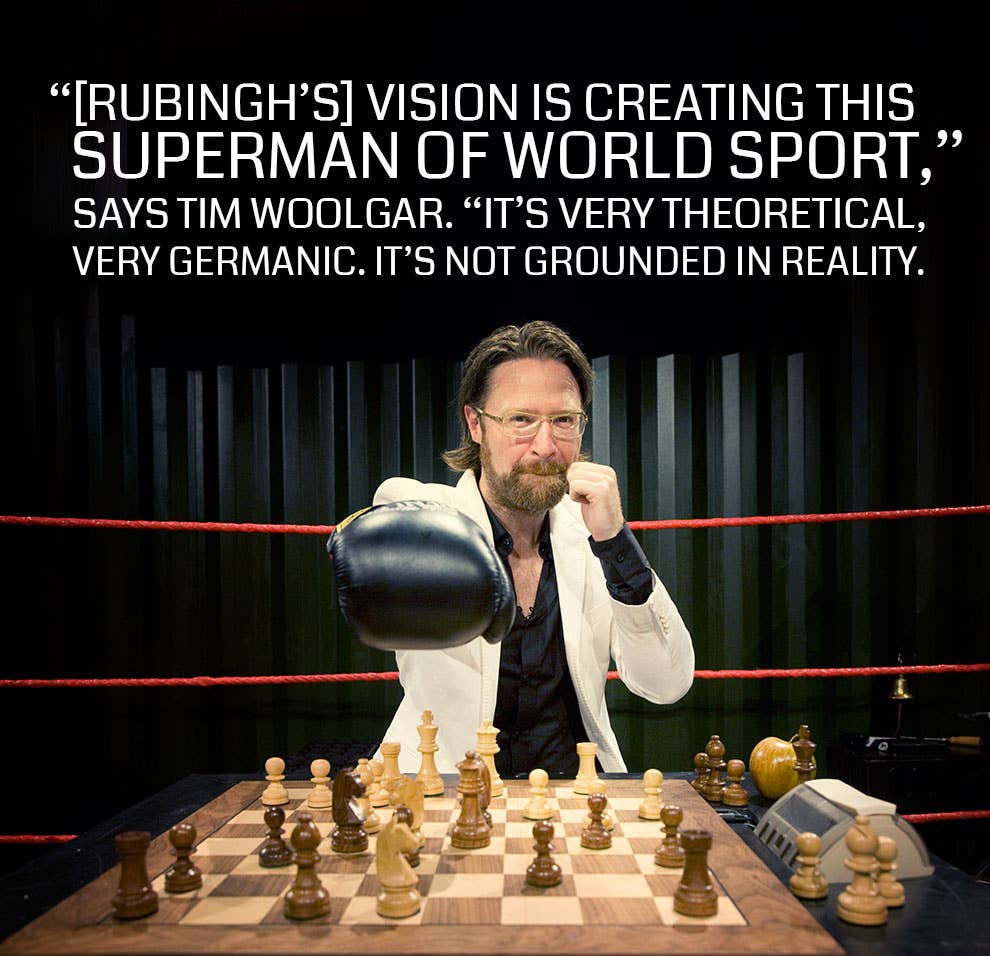
Chessboxing is exactly what it sounds like: chess but with boxing. Two fighters — usually men, though women have done it — step into a ring with all the pomp and circumstance of the most self-assured professional fighter. The bell rings, they sit down in the center of the ring, and play four minutes of speed chess against the clock. The competitors wear bulky headphones to drown out the sound of the crowd, whose members watch the in-ring action unfold on giant screens above. Once the four minutes are up, the fighters retreat to their corners while the ring crew scurries around, setting the board out of harm's way. Gloves are donned, and boxing, which lasts three minutes per round, begins. This repeats for 11 rounds, or until one fighter passes out, runs out of total chess-playing time (12 minutes), or is checkmated.
Many people may know about chessboxing via the Wu-Tang Clan, whose "Da Mystery of Chessboxin'" was inspired by a 1979 kung fu film, Mystery of Chessboxing, also known as Ninja Checkmate, that RZA and GZA watched as teenagers on Saturday morning UHF TV broadcasts. (The movie's villain is called the Ghost Faced Killer, which also made an impression.) Though both of these cultural reference points can claim a role in the genesis of chessboxing, it's more as a ur-meme, inventing the name and implanting the general concept that mixing chess and boxing would be cool in people's minds, rather than any of the particulars. The sport's actual origins are arguably stranger.
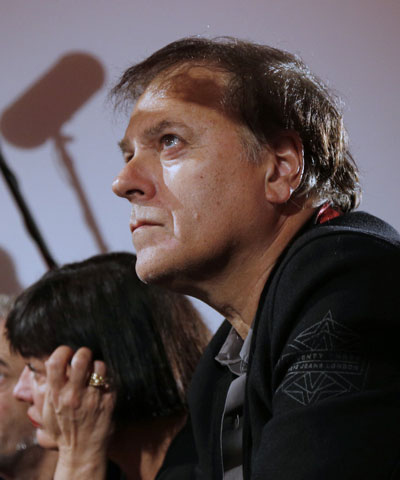
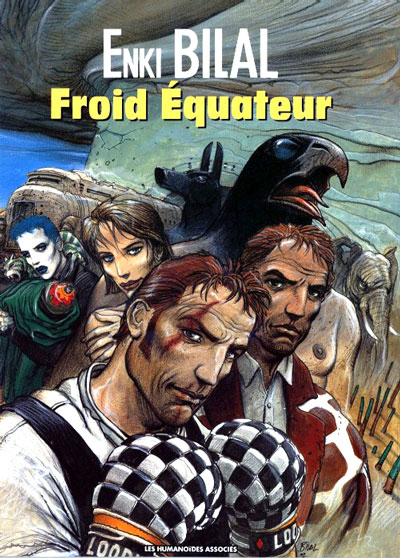
In 2003, a Dutch performance artist in his late twenties named Iepe Rubingh took the idea for chessboxing from a sci-fi graphic novel called Froid Équateur ("Cold Equator"), written in 1992 by a Franco-Yugoslav artist named Enki Bilal. In it, millionaire fighter John-Elvis Johnelvisson slugs away with the enigmatic Loopkin. Bilal's vision of chessboxing is dark, dystopian; by the end of the bout, both men are battered and beaten, their eyes white pinpricks underneath heavy, bloody brows.
"I remember there was this sketch," Rubingh explains, calling from a Berlin park in midsummer. "The people fight, then play a grandmaster game of chess. And I just... It clicked." Rubingh and a Dutch lawyer called Jean-Louis Fainstra had been going to boxing training together, and were eager to have their first bout against each other. "I said to him that if we're going to fight, we're going to do a chessboxing fight," Rubingh says. Fainstra was dumbfounded by the suggestion, but went along with it. Rubingh gained funding from Dutch arts organizations to put on the show.
The club that agreed to host the bout — Paradiso, on de Weteringschans — was once a church that became a squat for hippies in the late 1960s. In the absence of the creepy environs of the graphic novel, Paradiso, with its barrel roof, overhanging balconies, and large stained glass windows, was the next best venue, in Rubingh's opinion. The practicalities also changed slightly from its graphic novel origins: The bout time was shortened, and rules were written up in concert with the Dutch chess and boxing associations.
"We had Dutch TV there, German TV, Japanese, French TV," Rubingh recalls. "We had an official press conference. And we were saying, 'OK, people really want to see this.'"
All told, the November 2003 novelty match drew 1,200 spectators to Amsterdam to watch Rubingh and Fainstra chessbox for 11 rounds. Rubingh, fighting as the self-anointed "Joker," won and became the world chessboxing champion by default.
Though it retains that fantastical, somewhat absurd veneer, in the intervening decade, chessboxing has managed to evolve. Rubingh estimates there are maybe 500 people worldwide actively involved in competition under his umbrella organization, the World Chessboxing Organization (WCBO); 125 alone are members of the Berlin chessboxing club where he now trains. There's a club in China, in India, in Italy; South Africa, Australia, and Russia chessbox, as does Bulgaria. Absurdly, Iran (where pro boxing is banned) recently opened its own affiliate. The Los Angeles Chessboxing Club, which claims no official affiliation, held its first event in New York this summer at the famous Gleason's boxing gym, butting up against NYC ChessBoxing, a club set up in March.
Each regional or national organization comes together much in the same way: One dedicated guy sees or hears about the sport and gets the bug. (YouTube, and the ability to remotely watch chessboxing bouts from Croydon to Calcutta, Tehran to Tbilisi, has helped spread the sport.) The organization draws together a group of like-minded people, and begins small, with members training at local gyms. Eventually, they graduate to promoting their own shows. (India's chessboxing organization was founded by Montu Das, a former kickboxer. His second tournament held in July attracted 200 potential fighters.) Then a club applies for accreditation with the WCBO.
But Rubingh wants to raise barriers to entry, and generally to smarten up his sport. The performance artist has become a tycoon, promoting events and legitimizing chessboxing. The world championships will be held next week in Moscow under the banner of a new brand name, Chess Boxing Global (CBG). Rubingh's making the leap to turn his 10-year-old art project into a mainstream sport. He has secured investments from Enki Bilal, chessboxing's accidental progenitor, and Soundcloud founder Eric Wahlforss, to build the group internationally. The WCBO is offering €1,500 purses (a little over $2,000) for prizefights.
"We filter," Rubingh explains. To pass muster, fights must be organized with a degree of professionalism; the fighters themselves must meet certain standards in chess and have boxed for a year.
And with this attempt to become legit comes casualties. "We decided to cut loose the London Chessboxing Organization, because it couldn't live up to WCBO standards," he explains. "Don't get me wrong, I respect everybody that steps into the ring because I did it myself. But I think the quality of the sport and the image of the sport is also being damaged by such events, which are more of an entertainment. We have a lot of people training, but fighting — fighting seriously — there's only a very small, dedicated group."
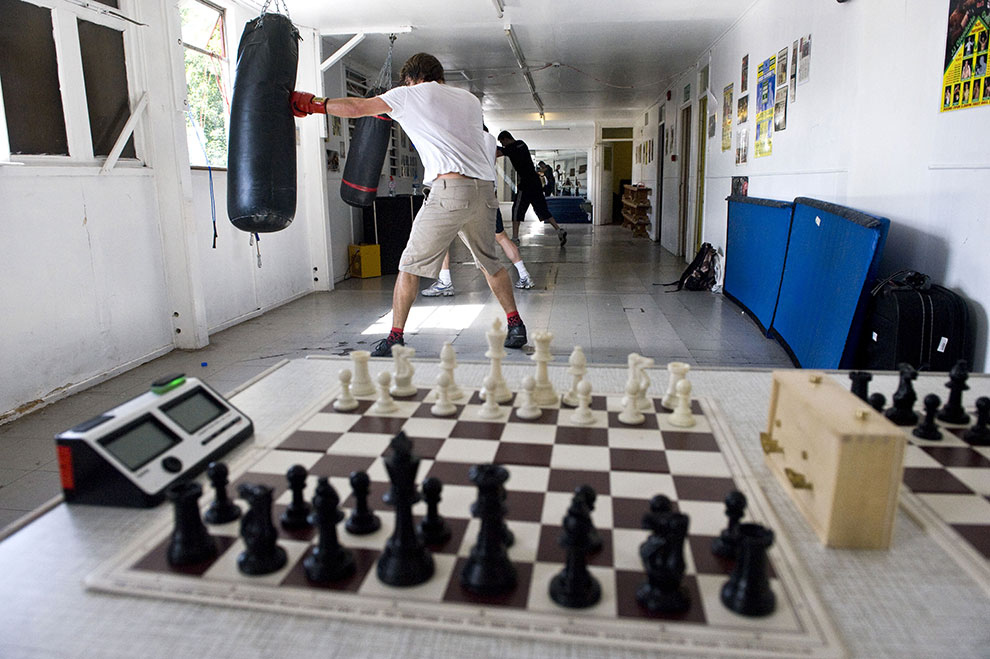
The Islington Amateur Boxing Club, a red tin hut on the fringes of a rabbit warren housing estate, is the part-time home of London Chessboxing, the now-unofficial U.K. outpost of the sport. No amount of PR work could portray the surroundings as anything but shabby, which may go some way to explaining why London was cut out by Rubingh.
"The sport tends to attract people who don't follow convention," says Read on the morning of his fight. The walls of the boxing club are lined with pictures of prizefighters, young and old, looking battered, at times bloody, but always resplendent in victory. They hold the typical fighters' posture: hands up near the face in a boxing pose, looking tough for the camera.

Read doesn't look like any of the people in the pictures. He doesn't look like your typical boxer — because he isn't. (He was given his ring name, "Crazy Arms," because, as he says, "My left arm and my right arm don't seem to have any communication: One turns in a slightly larger arc than the other, and at different speeds.")
Read runs a chess shop on the classy Baker Street in London, and works for CHESS Magazine. He handles the chess side of the training, leaving the boxing tuition to 41-year-old Anthony Wright, a gap-toothed, squat bull of a man who looks like he could break you in an instant but chooses not to. Both men learn from each other, and are typical of the roster of world chessboxers: You're either a boxer who's picked up chess, or a chess player who has come to boxing. (Certainly, they're not in it for the money: Purses for a world title fight in London don't go beyond about $540, or approximately €400; first-timers get less than $100, or about €70, for their efforts, roughly double the cost of a standard standing ticket to see the fight, and a fraction of WCBO payouts.)
One day Wright saw two men training at the Islington Boxing Club, flailing their arms around in a weak imitation of punches. A superior boxer, Wright walked up to them and started giving them advice for their sparring sessions. One of them was Tim Woolgar, a former television executive who had seen a chessboxing event in continental Europe and was just mad enough to decide he'd bring the sport to the U.K. And since that day, a magnetic yellow-and-black demonstration chessboard has hung on the wall, next to one of the 13 punching bags that line the perimeter of the Islington Boxing Club.
Woolgar denies that there is bad blood following Rubingh's decision to cut London loose — but the split certainly wasn't amicable. According to him, to be part of the WCBO, you have to give up 75.1% of your business to the organizing body. Woolgar wasn't willing to.
"Clearly that wasn't acceptable," Woolgar says. "When they didn't have a chessboxing scene in Germany, we carried the flag for years" as the sport found its feet. "They didn't appreciate that. But it's just the way things go."
Woolgar continues: "[Rubingh's] vision is creating this superman of world sport," he explains. "It's very theoretical, very Germanic. It's not grounded in reality. I know what audiences like; for him, entertainment was never a factor."
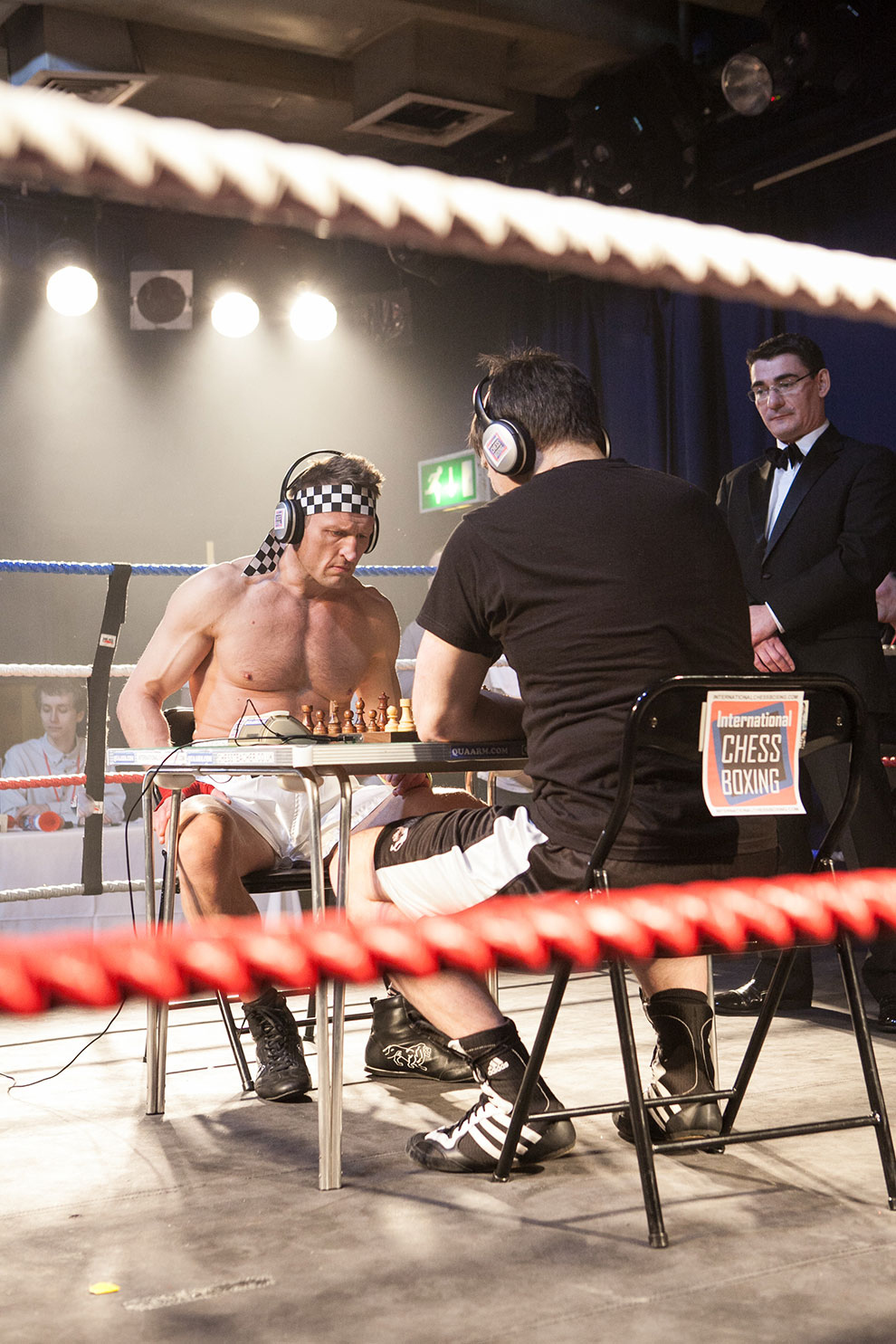
"It's two different shows," explains Nick Cornish over the sound of yapping bulldogs (he breeds them, and nearly didn't pick up the phone, thinking it was another person looking for a puppy) on a dark November night. Cornish is unique: He's one of the few people who has fought both for London chessboxing and one of Rubingh's WCBO-accredited events.
"The U.K. one is more cabaret style — more of a jovial, carnival atmosphere, and the interlude acts," he says. "You get an eclectic audience, not a boxing spit-and-sawdust audience — intellectuals, arty types. In Germany you see it's very serious, well-organized, everything's taken care of."
Cornish, who was introduced to the sport in his late thirties by Matt Read, was singled out by Rubingh as perhaps the only U.K.-based chessboxer he'd pick up for his WCBO events, and Cornish jumped at the chance. The hypercompetitive nature appealed to him, and four months before his bout, he began training in earnest.
"I literally trained every day with pros and amateur boxers," he says. He'd go for miles-long runs in the mornings and hit the gym at night. He'd fall asleep at work, shattered from the preparation. "Not everyone [in the U.K.] trains as hard as I do, and you can see that in the matches. Not everyone has the time or dedication to do that, combined with a job. I happen to be one of those guys who does."
Now, pushing 40, by his own admission, he worries that competing again for Rubingh's troupe is probably past him. "There was a time when I was desperate for that."
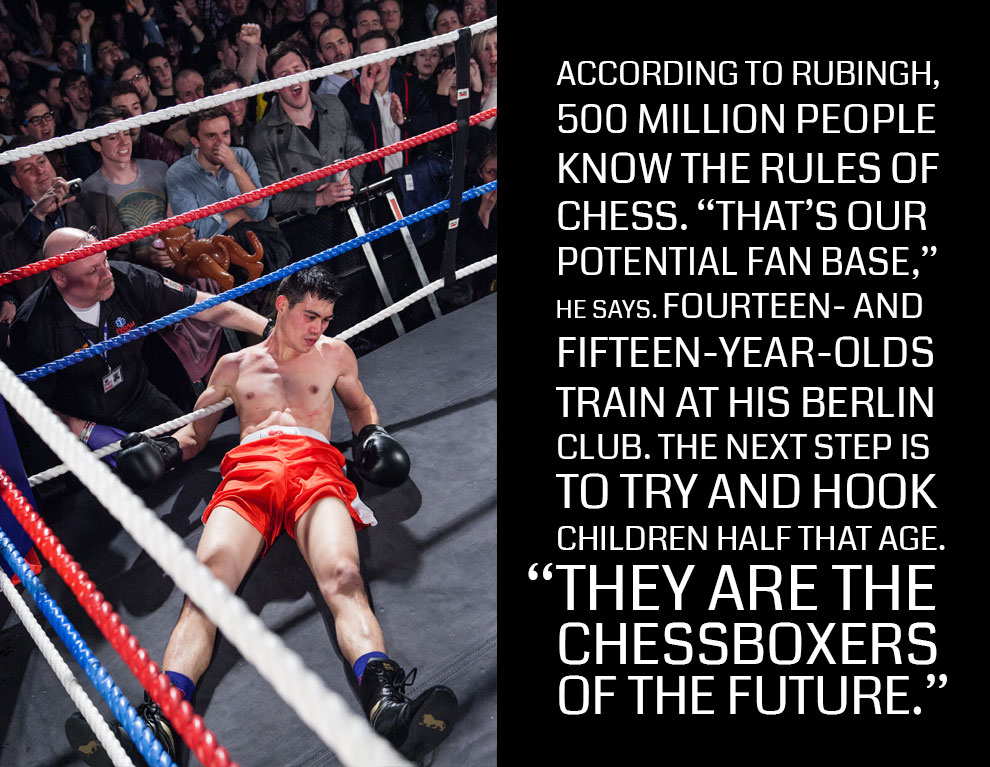
Round 9: The chessboard is set up in the middle of the ring, and Read and his opponent, Chris Levy, sit down, sweat covering their bodies. Taped hands pick up pieces and move them in a flurry — both men have less than a minute left on the clocks that count down the time they're allotted to make their chess moves — as the crowd shouts encouragements.
Though Read's an experienced chess player, the lights, the environment, and the feeling of sound waves hitting the fine hairs on your skin, even if you can't hear the shouts themselves, get the better of him.
The in-ring temperature under the spotlights can reach 90 degrees Fahrenheit; heart rates can rise well beyond normal levels. Read has spent many of the prior rounds being knocked from pillar to post by Levy. By his own estimation, based on prior experience, for the first 30 seconds or so of each chess round, you're not fully focused; your mind is still adjusting from brutality to brainpower.
It makes the next move seem more reasonable. Read's left his queen open for the taking. In a second, it's gone, and the moves become more frenetic. Each man's move clock drops below 30 seconds, then 15, then the referee steps in.
Due to a technicality involving a piece position being repeated three times, the match is over. It's a draw. The crowd boos.
Both men explode. Competitive spirit and a desire to entertain commingle. Bravado takes over; Read stalks the ring, shouting, "I want another round." His opponent's just as insistent. After a brief discussion, the emcee comes over the microphone: Both men will fight one more round — of boxing — to decide a winner.
The chessboard's hurried away, gloves are fitted.
"Seconds out, round 10," comes the shout over the speakers.
Both rush out of their corners, swinging like men who know they haven't got much more to give.
Attending the fight is Ray Keene, Britain's first representative to achieve a grandmaster result, a title awarded to chess players of a particular proficiency, back in 1974. He holds an Order of the British Empire, awarded by the royal household for services to the country — in his case, chess. He covers chess for several national newspapers and has written more books on chess than years he's lived. And he attends chessboxing matches.
He's 65, and in the time it takes to drag his heavyset body up The Scala's seemingly endless flights of stairs toward the restroom, he's breathing heavily, barely audible above the muffled music of the fan dancer entertaining fans between fights. Her speciality is stubbing out cigars on her tongue. Keene boxed in his youth, he tells me, and obviously played chess. Would he have partaken in chessboxing when younger? Winded, he replies quietly, "Not the boxing bit, no."
But the old grandmaster is impressed: The chess is good — "it's club player standard," he points out — and it's "absolutely" a boon for chess in general. "It's what draws in younger players."
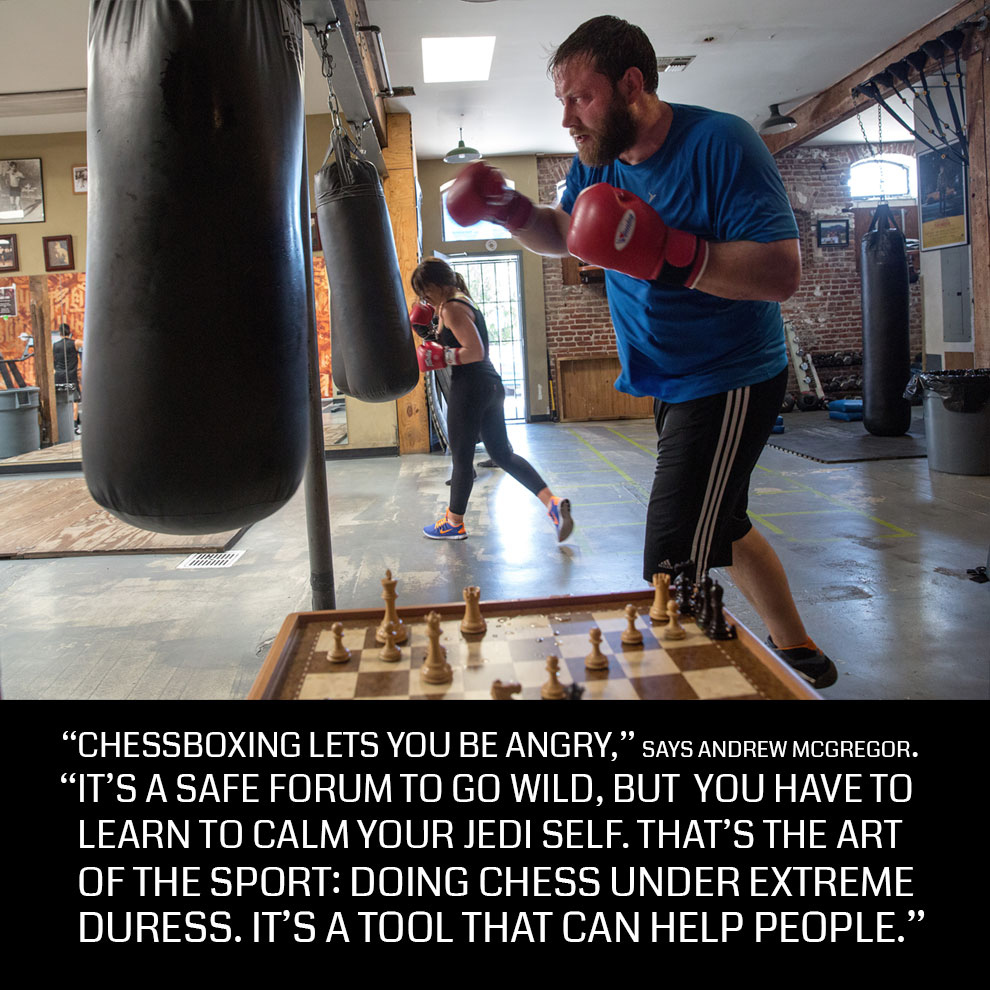
Rubingh sees chess' popularity as being key to chessboxing's potential success: According to him, 500 million people worldwide know the rules of the game. "That's our potential fan base," he says. Fourteen- and fifteen-year-olds train at his Berlin club. The next step is to try to hook children half that age. "They are the chessboxers of the future."
But here lies the problem with attracting kids, and with the sport in general: Chess itself is a harmless pastime — less so once you add all the head trauma. There is always the risk of injury. The British Medical Association has been voicing its opposition to boxing for over 30 years and is actively trying to get the sport banned, worried about chronic brain damage and the onset of the likes of Alzheimer's and Parkinson's disease. Since 1984, the American Medical Association has warned of boxing's dangers; Australia's national medical body reaffirmed its opposition to the sport six years ago.
Those who come to chessboxing from a chess background know they need their faculties: to memorize the best responses to a particular opening, to travel five moves into the future, to forecast their opponent's mentality and likely moves, and to plan a strategy that brings them the checkmate. That ability gets diminished every time you take a hit to the head.
Surprisingly, some believe the sport could have health benefits. Many chessboxers, in describing it, speak of the difficulty in managing your adrenaline in transitioning from a round of boxing to a round of chess. "Oxygen's going into your muscles, not into your brain," says Rubingh of his struggles on the board. There are hopes that applying a chessboxer's mastery of his body — the ability to tamp down aggression and to think in the fug of battle — to medical research could help those with behavior problems.
Andrew McGregor, the founder of the Los Angeles Chessboxing Club and a former war photojournalist, wants to see if soldiers suffering from post-traumatic stress disorder (PTSD) can find solace in the squared circle. He took up the sport when he returned from a particularly difficult reporting trip in Democratic Republic of the Congo. "I couldn't feel emotions," he begins. "It got me emotionally realigned. It lets you be angry; it's a safe forum to go wild, but also with the chess you have to learn to calm your Jedi self. That's the art of the sport: doing chess under extreme duress. It's a tool that can help people."
Regulating emotions and switching between active violence and passive consideration of the chessboard are two elements a good chessboxer needs. Both, scientists say, could have meaningful real-world applications. Chessboxers have to quickly dissociate themselves from what has gone before: They can't worry about their last chess move when their opponent is swinging punches at them; similarly, they can't let their adrenaline overrule their head on the chessboard. For veterans or those with a quick temper, chessboxing could be dissociation training that allows them to neutralize any bad or aggressive thoughts.
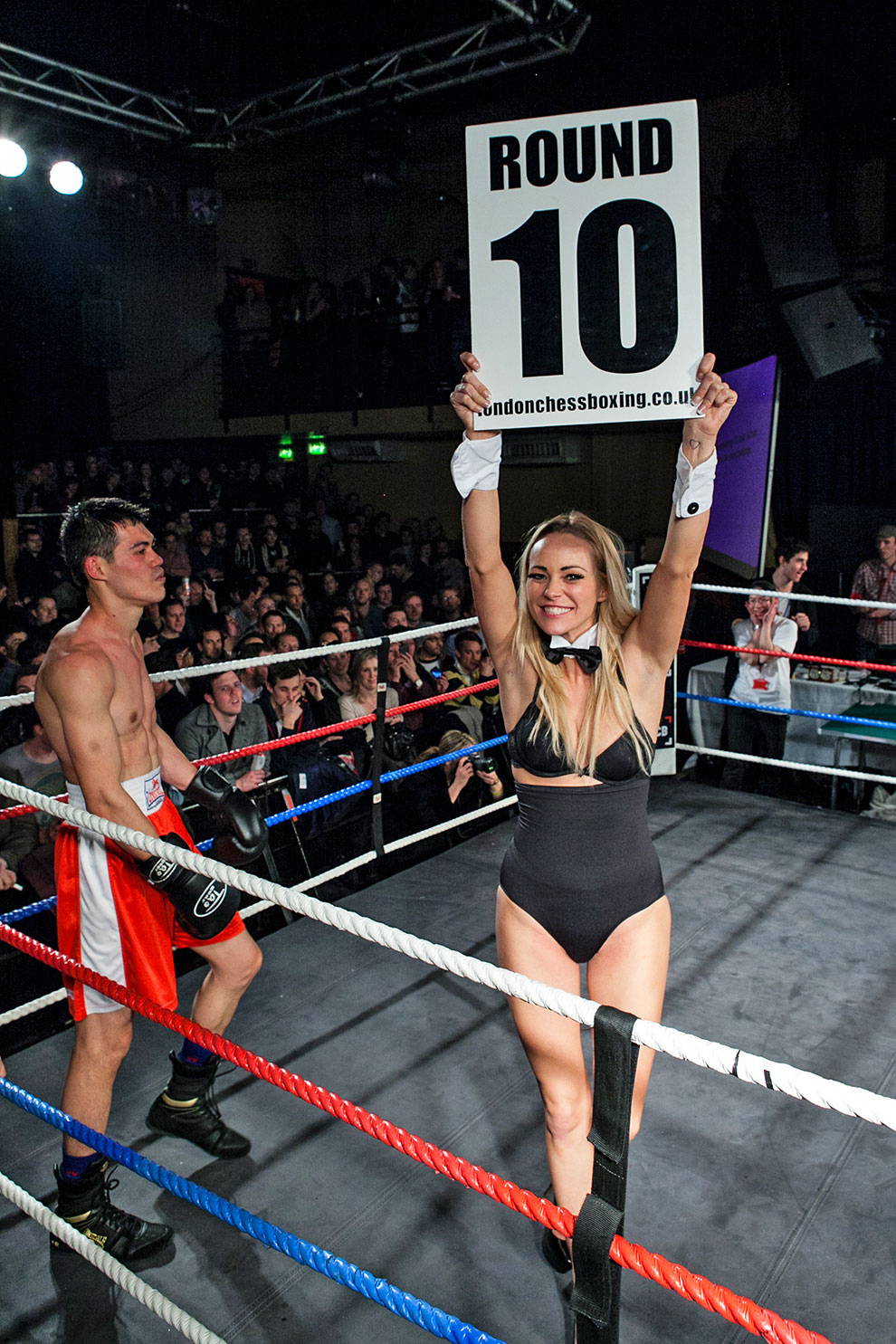
Round 10: Spurred on by the crowd's roar, the two men go hell for leather in the final bonus round. Read lives up to his Crazy Arms nickname, swinging wildly and sometimes at thin air. Precision and dexterity go out the window: This is a clobbering contest.
Knowing they won't have to calm down again for a subsequent round of chess, and not thinking about tomorrow morning, both men repeatedly land heavy blows on each other. But neither of them goes down for the count.
The noise doesn't stop for the full three minutes, with several in the audience shouting themselves hoarse. Suddenly the spotlights feel a little brighter, the room a little warmer; everyone takes a half-step closer to the action, sucked in by the excitement.
When the Klaxon goes and the referee splits the two fighters, huge cheers (and a few plastic pint glasses of beer) go up. The decision is turned over to the judges: They have to determine who landed the most clean blows.
Read ends up winning his fight on points, 4-3. Both men are spent — they practically prop each other up when hugging after the match, and Read's hand barely makes it beyond his shoulders when raised by the referee.
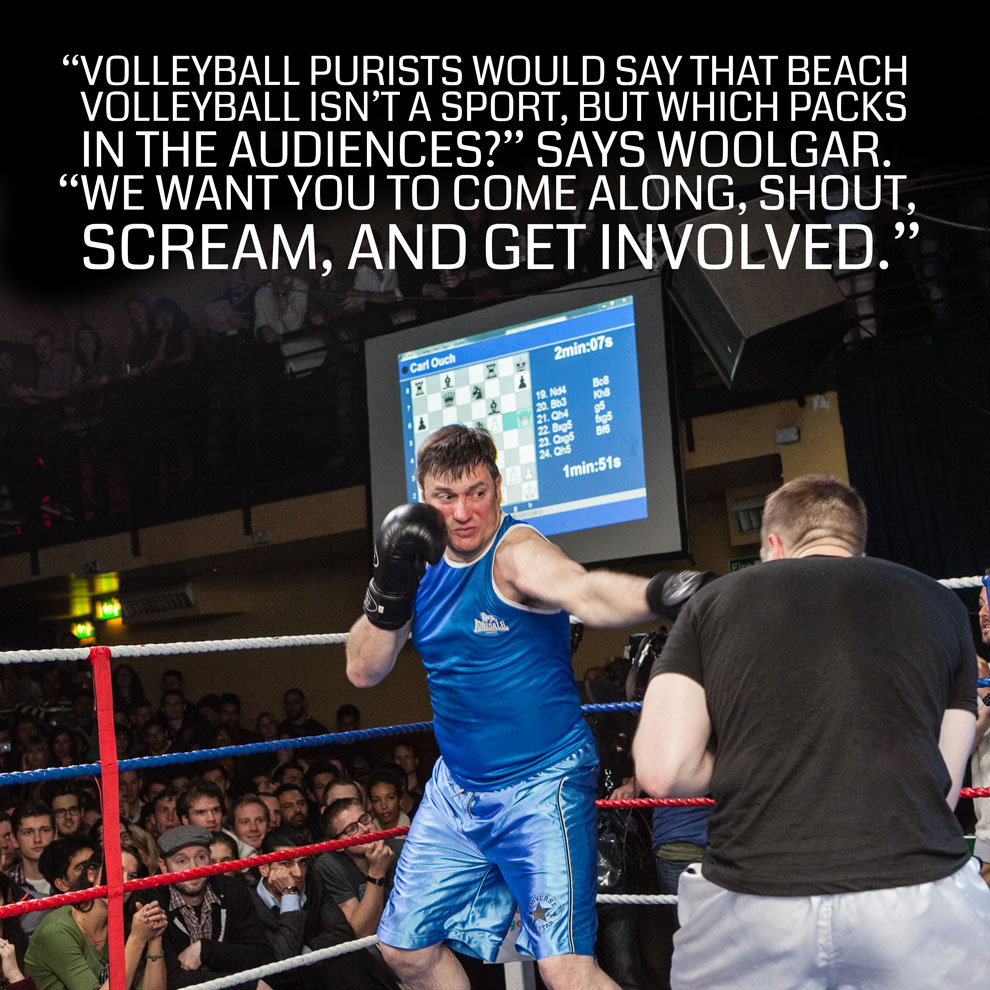
"Chessboxing has something very unique that's not represented in any other sport," Rubingh says from Berlin. "You need mental and physical strength in one discipline." And, presumably, under one umbrella body.
"There's nothing wrong with being serious, but Iepe's always had that slightly uptight attitude," Woolgar, the man who brought chessboxing to the U.K., tentatively explains. "What's integral is that Corinthian spirit" — keeping chessboxing rooted in its history as a cooperative.
Cut from the WCBO, Woolgar has ploughed his own furrow. His more fun-loving branch set up its own licensing body, the World Chessboxing Association (WCBA), welcoming affiliates from Italy, Russia, and Spain. It'll crown its own world champion in 2014. The committed part-timers may have brought chessboxing through its early years to a firm footing, but in Rubingh's vision of chessboxing, they're not needed anymore.
But Woolgar worries that the charm of the sport will be lost along the way. "I liken it to the difference between volleyball and beach volleyball," he says. "Volleyball purists would say that beach volleyball isn't a sport, but which packs in the audiences? I'd like it if chessboxing takes off in a way that beach volleyball did: People thought it was fun, they could engage with it, it's not an arm's-length sport. We want you to come along, shout, scream, and get involved."
"We're creating the smartest, toughest man on the planet," Rubingh counters. "If we do it well, if we raise the quality, we get out with the product with TV sponsorship," there is potential for chessboxing beyond a humid nightclub in London. Rubingh's thinking stadium events. He draws a comparison with biathlon, a niche Olympic sport, but popular in Germany and Scandinavia. "It's humongously popular. It's on TV. It's heavily sponsored." That's the end goal: the Olympics. That's the future.
I ask Rubingh what he thinks makes a particularly good fighter. He pauses to think for a moment.
"You have to be cold-blooded."
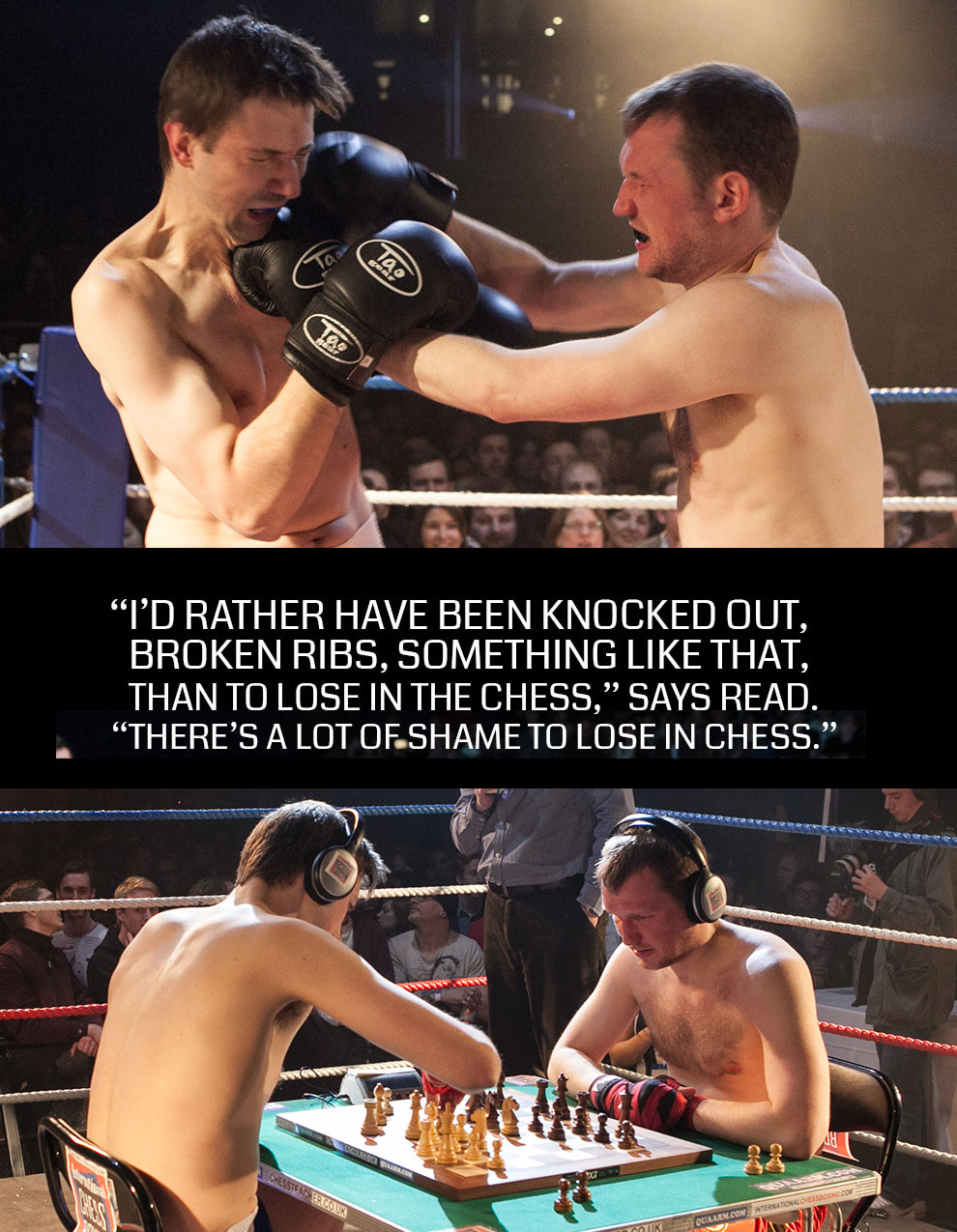
After the bout, Read walks through the crowd through a set of double doors and down four steps. He crosses the main bar, where a few parched patrons had leaned up against the bar to beat the crowd that would flow through between fights, and ducks behind the curtain into the changing room. He and Levy smile, hug, and talk a little about the fight.
"I'm only 33," he says, eyes rolling up to the top of his head as he tries to recall his age, "34 this year, so maybe I have a couple more [fights in me]. When I first started in the sport, I was good. Very good chess, reasonable boxing. That was good enough to win my first five fights, then I lost my last two — in quite horrible style. Similar to what you saw there, except I didn't land any. I just took them all, and took them harder."
By now he's unwrapping tape from his wrists and forearms, and has slumped back onto the black leather couch at one side of the room. He draws his forearm across his forehead to remove the sweat, and runs his fingers through his hair, matted down with perspiration to his skull. He starts undoing the laces on his right boxing boot, and slips his foot out of it.
"Anthony's a great coach, he's given me my experience, he's given me my confidence back to take on better guys, and Chris is a top chess player like myself, and, well, you can see — I've got damage. He hits hard."
Read looks down at the open scratch by the front of his left armpit, then paws at the back of his ribs, red and raw from punches. They look painful and distracting when it comes to playing the chess rounds.
"Oh god," he cries. "I felt I played badly, I lost a pawn early on, didn't really have any counterplay." He's slowly undoing the laces on his left black boot, unfurling his fists in a labored fashion. "But I did manage to take his time right down, which meant that basically I was fine for, you know, trying to get into a better position, which forces us back to the boxing."
Read looks me dead in the eye: "I didn't want to lose in the chess. I'd rather have been knocked out, broken ribs, something like that, than to lose in the chess. There's a lot of shame to lose in chess." It's not a sentiment, staring at his sheer exhaustion, that I'm sure I can agree with — but it's admirable nonetheless.
By now people have realized Read's left boot is going nowhere. He may have gone 10 rounds with a closely matched opponent, but the battle against his footwear is one fight too far. Someone comes over and loosens the laces. Read wiggles his left leg, but the foot isn't coming out of its boot. The second now grabs the boot, lifts Read's leg up, and pulls with all his might. For a while nothing happens. Read leans back on the leather couch and braces himself against the backrest. With a final pull, the boot comes free. Read relaxes his body and breathes out with a half-sigh. I ask him how he's going to feel tomorrow.
He laughs and looks at me.
"Crap, I imagine," he says. "But for this evening I'm going to feel like a million dollars. Because that's the beauty of this sport. It really does allow the adrenaline to get through all the worst knocks and scrapes. Tomorrow morning will be a different matter."
